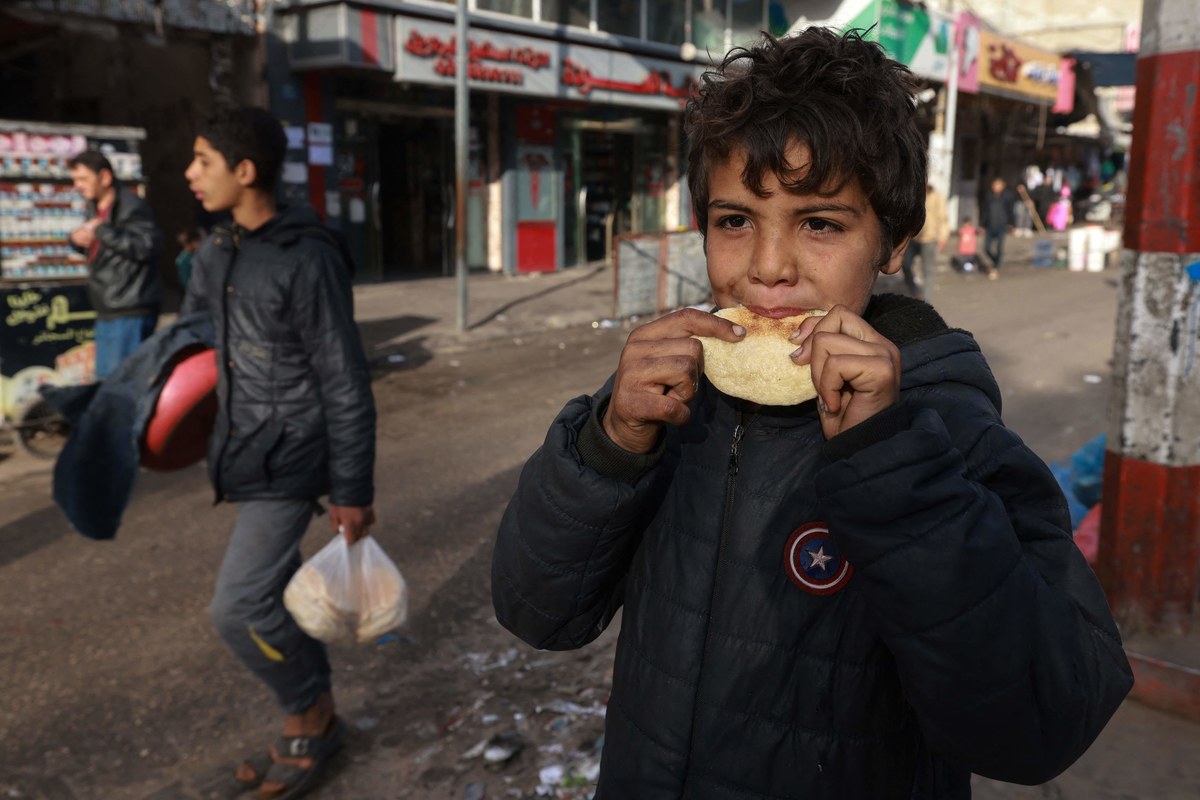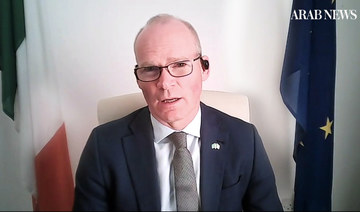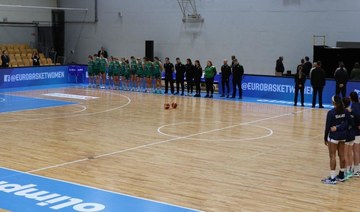DUBAI: The Republic of Ireland will look at the option of imposing sanctions unilaterally on extremist Israeli settlers on Palestinian land if the European Union is unable to agree on a collective response, according to the country’s minister for enterprise, trade and employment.
Appearing on the Arab News current affairs show “Frankly Speaking,” Simon Coveney said Ireland would prefer to act collectively with its EU partners, but could be compelled to follow Spain in acting unilaterally if a deal is not agreed.
“Yes, we’ll look to try to do that, but we would much rather that these sanctions were imposed collectively by the European Union. There are 26 of the 27 countries that are in agreement in terms of doing that,” he said in course of a wide-ranging interview.
“Let’s not forget the US too has introduced sanctions on violent settlers in the West Bank to send a very strong signal that they regard what is happening in part of the West Bank in terms of violence against Palestinians as totally unacceptable.”
Violence in the occupied West Bank has increased since the Hamas attacks of Oct. 7 sparked Israel’s military operation in Gaza, with extremist Israeli settlers using the chaos to seize more Palestinian land.
Ireland has been among the most vocal international critics of Israel’s military campaign, which to date has cost the lives of more than 30,000 people, according to Gaza’s Hamas-run Health Ministry. Another 7,000 people remain missing and at least 70,450 are injured.
Coveney himself was recently quoted as saying that Israel was behaving like a “rogue state” in Gaza. “My comments in relation to the war in Gaza were a reflection of the frustration of many Irish people, but also many other people around the world that want to see progress on finding the basis for a ceasefire,” he told Katie Jensen, the host of “Frankly Speaking.”

Simon Coveney, Ireland’s minister for enterprise, trade and employment, said Ireland provides significant funding to support programs for Palestinians across the West Bank and previously across Gaza as well. (AN Photo)
He continued: “And then, of course, trying to make that ceasefire permanent so that we can focus on responding to the extraordinary human suffering that we’re seeing across Gaza now.
“That’s not in any way to diminish the strong Irish criticism and condemnation of the terror attacks that happened to Israeli citizens on Oct. 7 last. But since that awful attack on Israel, we have seen a level of military activity in Gaza that has been devastating.
“We’ve seen almost 30,000 lives lost, many of them women and children. And, of course, a population within Gaza now that is close to starvation. And we need to respond in the context of international law, international humanitarian law, the UN Charter.
“My comments were about responding to the fact that Israel seems not to be listening to many of its partners and allies who are now encouraging restraint and trying to find a basis for a ceasefire.”
Coveney has also said that Israel should not “behave like a monster in order to defeat a monster,” in reference to the country’s military retaliation to the Oct. 7 attack, which saw 1,200 Israelis and other foreign nationals killed and 240 taken hostage.
“When I said you can’t become a monster to defeat a monster, really what I’m referring to there is that a democratic state like Israel has got to abide by the parameters of international law,” he said.
“Even war has rules. We all have a responsibility to hold each other to account in the international community. And in our view, in Ireland, what Israel is doing in Gaza is completely disproportionate to what’s required, as necessary for the defense of Israel.
“The thousands and thousands of children and women who’ve lost their lives under buildings that have collapsed on top of them, this is something that needs to stop and needs to be called out, and is not necessary for the defense of Israel.
“Of course, there must be a consequence to what Hamas did on Oct. 7. And Israel has a right to defend itself.
“But the extent of what has happened, and the loss of life and injury in Gaza, is in my view not justified and is certainly a breach of many aspects of international law and humanitarian law that needs to be called out, which is why we are such a strong advocate for a ceasefire.”

Palestinian child eats bread in Rafah in the southern Gaza Strip on March 4, 2024, amid the ongoing conflict between Israel and the Hamas movement. (AFP)
The World Food Programme has warned that a famine is imminent in northern Gaza, which has received very little aid in recent weeks, and where an estimated 300,000 people are living with little food or clean water.
On Thursday, at least 112 Palestinians were killed and 760 injured while trying to get desperately needed aid in Gaza City in the presence of Israeli tanks.
Hamas has accused Israel of firing at civilians, but Israel said most died in a stampede after its troops fired warning shots. Leaders around the world have called for a full investigation.
“Even in the absence of conflict, the efforts that the international community are going to need to put in place in Gaza to prevent starvation, to respond to the extraordinary challenges around healthcare and basic provisions is huge,” Coveney said.
“There are only a few hospitals left that are actually functioning in Gaza.”
Given the incredible destruction, the sheer size of what has taken place in the enclave, would Ireland be willing to step in and help with reconstruction efforts when the war eventually comes to an end?
“Absolutely,” said Coveney.
He explained that Ireland provides significant funding to support programs for Palestinians across the West Bank and previously across Gaza as well.
“We’re one of the strongest supporters of UNRWA, as really the only scaled-up humanitarian organization that can provide the scale of supports that Palestinians need, in Gaza and indeed across the West Bank,” he said, referring to the United Nations Relief and Works Agency for Palestine Refugees in the Near East, which supports the relief and human development of Palestinian refugees.
“So, even in the last number of weeks, Ireland has, while other countries have actually been pulling their funding or freezing their funding to UNRWA because of a potential scandal of some UNRWA staff being involved in the terror attacks of October 7, even though a very small number may have been involved, let’s wait and see what the investigation determines.

Simon Coveney, Ireland’s minister for enterprise, trade and employment, told Katie Jensen, the host of “Frankly Speaking,” that “since that awful attack on Israel, we have seen a level of military activity in Gaza that has been devastating.” (AN Photo)
Separately, Ireland has tried to give a signal to other donors that, given the scale of human suffering in Gaza at the moment, UNRWA is an organization that needs to be supported, Coveney said.
“And so we have increased our funding by 20 million in the last number of weeks, which means now that we will be giving more than €40 million ($50.628 million) to UNRWA. And we hope that that gives a signal to other countries that are funders and supporters of UNRWA that they need to continue to do that,” he said.
The primary focus of Coveney’s visit to the region was the World Trade Organization’s 13th Ministerial Conference, which took place Feb. 26 to 29 in the UAE capital, Abu Dhabi.
Given the current geopolitical situation, however, the humanitarian crisis in Gaza and the tensions in the Red Sea naturally became talking points on the sidelines of Coveney’s interactions with this Gulf counterparts.
“It’s impossible to come to this part of the world and not talk about what is currently happening in Gaza, because everybody is watching and is horrified by the human suffering and loss of life,” he said.
“People know when they speak to an Irish government minister that we are both interested and engaged in this debate.
“So, yes, on the sidelines of a lot of the trade discussions, of course, we’re talking about regional conflict and it’s impossible not to focus on the Israel-Palestine conflict that we’re seeing right now in Gaza.
“Also, the tension that we’re seeing in terms of the Red Sea and what Houthi rebels are doing in terms of targeting shipping in the Red Sea, which essentially is targeting global trade, because about 30 percent of global goods trade transits through the Suez Canal and the Red Sea, which is significantly being disrupted right now.”
Asked if he noticed a contradiction between the Biden administration’s calls for Israeli restraint in Gaza and sending of weapons and shells to Israel, Coveney responded that the situation required for a realistic appraisal.
“The signal that would be sent to the broader Middle East region of the US preventing arms coming from the US to Israel would potentially be a dangerous one in terms of the signal to Iran and others who are enemies of Israel,” he said.
“I think the US knows that. So, we need to be realistic here on what’s possible.”




























